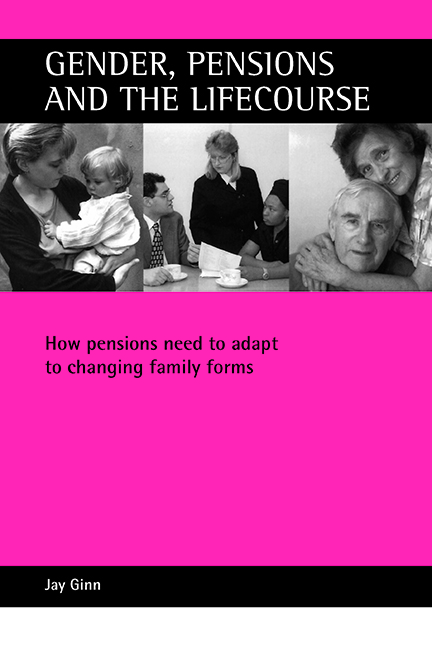Book contents
- Frontmatter
- Contents
- List of tables and figures
- Acknowledgements
- one Trends in gender relations, employment and pensions
- two Choice and risk in pensions: gender and class inequalities
- three Pension prospects for minority ethnic groups
- four Changing patterns of partnership: divorce and pensions
- five Impact of motherhood on pension acquisition: differentiation according to education
- six Gender and pensions in the European Union: towards an independence model?
- seven British pension policy: a gender perspective on alternative rescue plans
- References
- Appendix Statistical tables
- Index
six - Gender and pensions in the European Union: towards an independence model?
Published online by Cambridge University Press: 20 January 2022
- Frontmatter
- Contents
- List of tables and figures
- Acknowledgements
- one Trends in gender relations, employment and pensions
- two Choice and risk in pensions: gender and class inequalities
- three Pension prospects for minority ethnic groups
- four Changing patterns of partnership: divorce and pensions
- five Impact of motherhood on pension acquisition: differentiation according to education
- six Gender and pensions in the European Union: towards an independence model?
- seven British pension policy: a gender perspective on alternative rescue plans
- References
- Appendix Statistical tables
- Index
Summary
Key concerns of policy makers throughout the developed world are to ensure financial sustainability of state pension schemes without sacrificing adequacy of pensions to meet the needs of older people and future pensioners. Population ageing, which is partly due to falling fertility rates, has brought the question of sustainability of pensions into prominence, although whether this constitutes a serious problem, and in which countries, has been subject to debate (Walker, 1990; Mullan, 2000; Street and Ginn, 2001). Since the employment rate in the working age population is also important to the viability of any pension scheme (state or private) it is useful to consider the relationship between women’s fertility and their employment. Is there an inevitable trade-off, for women, between social reproduction and economic production?
The chapter first considers the social value of unpaid care work and compares women’s fertility and their employment across EU countries. Britain’s pension system is then compared with those of other EU countries in terms of adequacy, gender inequality of later life income and the treatment of family caring. Finally, the question of moving towards an independence model of pensions is discussed.
The gendered lifecourse and social reproduction
The research reported in Chapters Four and Five focused on the impact of women’s childcare commitments on their employment and pensions in the context of a lack of affordable childcare services in Britain. The government recognise that mothers find childcare a barrier to employment: “Women tell us that a key obstacle to their re-entering the labour market is accessing affordable and good quality childcare” (DWP, 2002, p 117), although it is not only childcare that conflicts with women’s employment participation. Women over age 50 are often called upon to provide informal care for ageing parents or parents-in-law or to look after their grandchildren while their daughters or daughters-in-law engage in paid work.
The provision of family caring and consequences for employment and pension building are usually seen as problems solely for women. For practical reasons, earlier chapters of this book are based on the assumption that working age carers are usually women, neglecting those men who also devote time to family caring at the expense of their employment, earnings and pension rights.
- Type
- Chapter
- Information
- Gender, Pensions and the LifecourseHow Pensions Need to Adapt to Changing Family Forms, pp. 83 - 96Publisher: Bristol University PressPrint publication year: 2003



